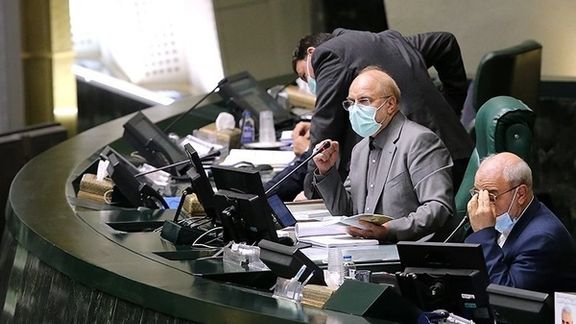Iranian Parliament Adamant To Impeach Economic Ministers

An Iranian lawmaker says the parliament is prepared to impeach President Ebrahim Raisi's economic ministers, but Majles leaders intentionally delay the process.

An Iranian lawmaker says the parliament is prepared to impeach President Ebrahim Raisi's economic ministers, but Majles leaders intentionally delay the process.
Lotfollah Siahkali, a lawmaker from Ghazvin and a member of the Iranian parliament's Industry Committee, said in an interview with Rouydad24 news website that the motion to impeach Iran's Industry Minister was handed over to the presidium in early March, but the body has still not put it on parliament’s agenda.
The Majles (parliament) began to warn Raisi about the weak performance of his economic team including the ministers of industry (Reza Fatemi Amin), labor (Hojjat Abdolmaleki) and economy (Ehsan Khandouzi), two months after Raisi took office in August 2021. Since then, Raisi has said repeatedly that he is planning a reshuffling but has not done anything yet. He had promised both during his election campaign and in the following months that he was adamant to improve the critical economic situation of ordinary people.
In the meantime, lawmakers have renewed their calls for impeachments almost every month. Siahkali said the ministers have been constantly lobbying with the Majles presidium to delay their impeachment. At least in one case, Majles Speaker Mohammad Bagher Ghalibaf told the lawmakers to wait until the Iranian New Year in late March before beginning to table the impeachment motion for the labor minister.
While the government claims it is exporting more oil and gas, inflation remains high, with people falling deeper into poverty. Lawmakers want to know why the situation is not improving.

Some have concluded that either the government is not telling the truth about boosting oil and gas exports, or it is spending the revenues on something other than improving the people's livelihood.
Siahkali is focused on the plan to impeach the industry minister by pointing out his failures and make sure that none of the economic ministers can avoid being impeached.
At the same time, complaints about the performance of other economic ministers have been on the rise. Iranian economist and Al-Zahra University academic Hossein Raghfar said this week that rising inflation and the consequences of handing over oil sales to powerful institutions outside the oil ministry and the National Iranian Oil Company, mainly to military entites such as the IRGC, are two of the problems created by the Raisi administration for Iran's ailing economy.
While some of the economists in Iran have predicted a triple-digit inflation rate in the coming, Raghfar said in his interview with the Iranian Labor News Agency (ILNA) that inflation will certainly rise further, while the government keeps publishing unrealistic figures, which people cannot believe.
He insisted handing over oil sales to the military sharply raises the cost of economic transactions and will lead to widespread corruption. All this will adversely affect the economy by creating instability that deterring investments. He added: "In this situation, we can say with a good degree of certainty that the recession and inflation, which overwhelmed the economy in the 2010s will continue."
Meanwhile Raghfar argued that even if a nuclear deal is signed and sanctions lifted, it will not be easy for Iran to solve its economic crisis. "I believe even without foreign economic problems; Iran's economy will find it hard to recover. There might be some additional revenue, but this will not affect the situation of investment and employment." He added that the Iranian government does not seem to have any solution to tackle these problems in the future.